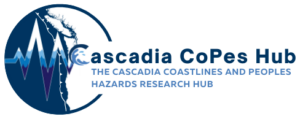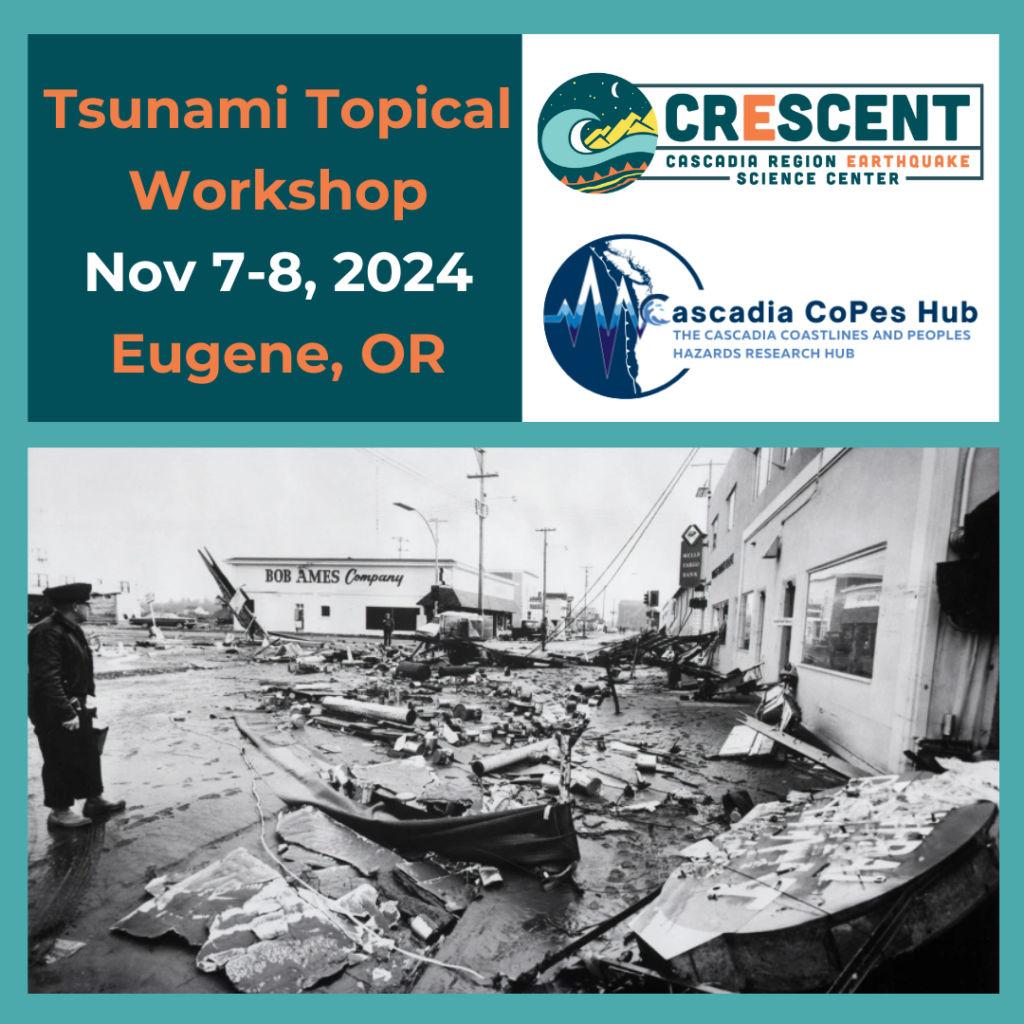
CRESCENT Topical Workshop
From hazard to risk: The science of planning for future tsunamis
November 7-8, 2024, University of Oregon, Eugene
Workshop Goals

From hazard to risk: The science of planning for future tsunamis
This cross-disciplinary workshop reviewed state-of-the-art of tsunami risk assessments, scientific gaps, and technical advancements to be implemented in the future. Designed to be of interest to participants from different scientific and engineering fields, the workshop addressed four core themes:
1) Geophysics: science of earthquakes and tsunamis
2) Probabilistic tsunami hazard assessment (PTHA): the methodology of how we quantify uncertain hazards
3) Fragility analysis: from hazard to risk
4) Implementation: How do our models/estimates make it into policy and industry applications?
This workshop is produced in collaboration with the NSF-funded Cascadia Coastlines and Peoples Hazards Research Hub (Cascadia Copes Hub).
Meeting Resources

Meeting Information Packet
Contents:
- Full agenda and discussion session titles
- Poster presentation list
- Pre-workshop questionnaire results
- In-person attendees list
Presentation slides and recordings
See links in Agenda below for available slide decks and session recordings.
Agenda

Note: all times Pacific Time
Day 1: Thursday, November 7
Catching up on the state of the field
- 7:30 am: Check-in and light breakfast (EMU 230 | Swindells)
- 8:00 am: Welcome and introduction to workshop (EMU 231-232 | Cedar and Spruce Combined)
- 8:25 am: Session 1 – Geophysics science of earthquakes and tsunamis
- Lydia Staisch, US Geological Survey – “Paleoseismologic data as constraints on subduction zone earthquake recurrence and rupture characteristics”
- Harold Tobin, University of Washington – “New observations and shifting paradigms for Cascadia megathrust and splay faults”
- Eric Lindsey, University of New Mexico – “Locked or Coupled? The semantics and science of future earthquake potential on the shallow megathrust”
- Discussion Session
- 10:20 am: Session 2 – Probabilistic tsunami hazard assessment (PTHA): the methodology of how we quantify uncertain hazards
- Diego Melgar, Cascadia Region Earthquake Science Center – “Earthquake Source Complexity and its Impact in PTHA”
- Ignacio Sepulveda, San Diego State University – “PTHA AND COASTAL PROCESSES: Non-stationary statistics and compounding hazards”
- Robert Weiss, Virginia Tech
- Discussion Session
- Noon: Lunch (EMU 230 | Swindells)
- 1:00 pm: Lightning talks on posters (EMU 231-232 | Cedar and Spruce Combined)
- 1:35 pm: Session 3 – Fragility analysis: from hazard to risk
- Ruben Vescovo, Tohoku University – “Tsunami Fragility estimates for damage quantification”
- Katsu Goda, Western University Canada – “Fragility Curves from Hazard to Risk: Tofino, British Columbia, Canada subjected to Cascadia Subduction Earthquakes”
- Dan Cox, Oregon State University and Fabian Lucero, Oregon State University – “Estimating tsunami risk”
- Discussion Session
- 3:30 pm: Session 4 – Implementation: How do our models/estimates make it into policy and industry applications?
- David Goldbloom-Helzner, US Environmental Protection Agency – “Tsunami Threats to Water & Wastewater Utilities in Pacific Northwest”
- Ron Eguchi, ImageCat, Inc – “How do our models/estimates make it into policy and industry applications?”
- Gary Chock, Martin, Chock & Carden, Inc – “Tsunami Resilient Design for High Hazard Regions”
- Discussion Session
- 5:00 – 7:00 pm: Poster session, and reception (EMU 145-146 | Crater Lake Rooms Combined)
Day 2: Friday, November 8
Case studies – present and future applications
- 8:00 am: Light breakfast (EMU 230 | Swindells)
- 8:15 am: Opening remarks (EMU 231-232 | Cedar and Spruce Combined)
- 8:40 am: Session 1 – Implementation of hazards assessment
- Jonathan Allan, Oregon Department of Geology and Mineral Industries – ” In Preparation for the Next Megathrust Cascadia Earthquake and Tsunami” and Jason Patton, California Geological Survey – “Cascadia PTHA Updates”
- Corina Allen, NOAA – “Working with partners to turn science into action, policy, warning, and risk reduction”
- Discussion Session
- 10:30 am: Session 2 – Determining risk parameter and mapping
- Steven Gibbons, Norwegian Geotechnical Institute – “Global Tsunami Model – Tsunami Hazard Assessment –the way forward towards Tsunami Risk analysis and mitigation”
- Kara Jacobacci, FEMA – “FEMA’s conceptualization of tsunami risk”
- Ankit Dubey, Aon plc – “Tsunami Risk: Perspective of Insurance/Reinsurance Industry”
- Discussion Session
- Noon: Lunch (EMU 230 | Swindells)
- 1:00 pm: Session 3 – Engineering design and policy (EMU 231-232 | Cedar and Spruce Combined)
- Elyssa Tappero, Washington Emergency Management Division – “Tsunami Evacuation Planning in Washington State”
- Althea Rizzo, Oregon Department of Emergency Management
- Discussion Session
- 2:30 pm: Discussion sessions and closing remarks
- 4:00 pm: Adjourn
Application

Registration Process and Fees
APPLICATION FOR IN-PERSON WORKSHOP PARTICIPATION IS NOW CLOSED. A remote participation option (zoom webinar) is available via the link below. Please note that not all workshop sessions will be available online.
There is no registration fee for this CRESCENT Topical Workshop.
Cancellation or Changes
If your plans change and you are no longer able to attend the workshop, please email sthoms@uoregon.edu as soon as possible. We will open your spot to another attendee.
Posters
We invite participants to present a poster showcasing their work related to tsunami hazard research and resilience. Please email jillf@uoregon.edu by 11/1/24 to confirm your poster title and authors. Poster dimensions should be a maximum of 60″ (height) by 48″ (width).
Workshop Planning Committee

The Tsunami Topical Workshop conveners have decades of combined tsunami research experience and bring multi-disciplinary, global perspectives to guide the planning process.
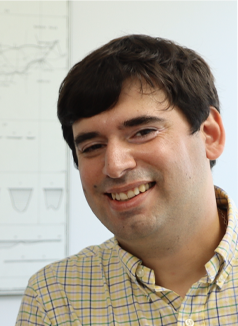
Ignacio Sepulveda
San Diego State University isepulveda@sdsu.edu
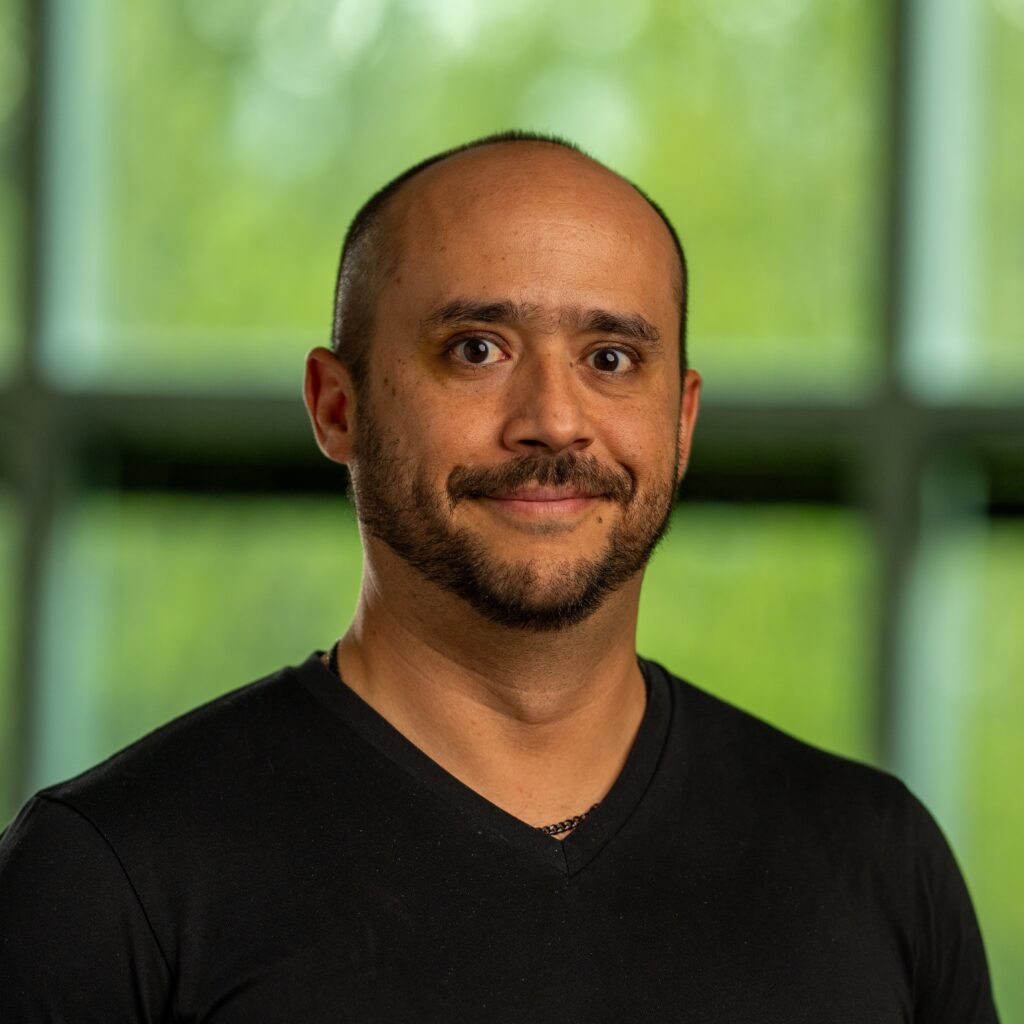
Diego Melgar
University of Oregon
dmelgarm@uoregon.edu
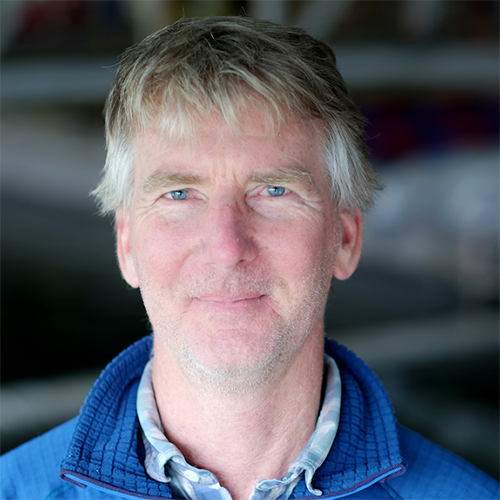
Dan Cox
Oregon State University
dan.cox@oregonstate.edu
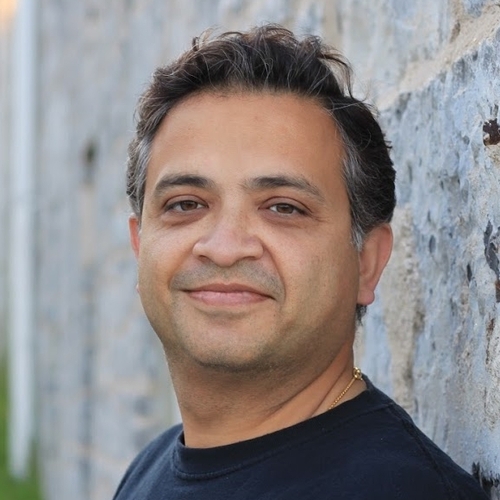
Shubharoop Ghosh
ImageCat, Inc
sg@imagecatinc.com
Travel & Lodging

7-8 November, 2024
Erb Memorial Union, University of Oregon
Venue
This CRESCENT Topical Workshop will be held in the EMU 231-232 | Cedar and Spruce Combined at the Erb Memorial Union, University of Oregon on November 7-8, 2024.
Local information
The EMU is located at the heart of the University of Oregon campus, within easy reach of downtown Eugene and surrounding places of interest. Click here for information on where to eat, drink and recreate, or check this map for more ideas.
Flights and ground transportation
Eugene airport (EUG) is a ~20 minute drive from the meeting venue. There is no public transportation from the airport to the university, though several taxi, shuttle and rideshare options are available.
Parking
The University of Oregon has two main parking garages that are an eight-minute walk from the workshop venue: 13th St Garage and Millrace Drive Garage. Daily visitor permits for other campus lots, including ADA parking spaces, are available via the University’s parking portal.
Lodging
The Hayward Inn and Best Western New Oregon are hotel options less than a 10-minute walk from the venue. Those selected to receive lodging support will have rooms reserved on their behalf at The Hayward Inn.


